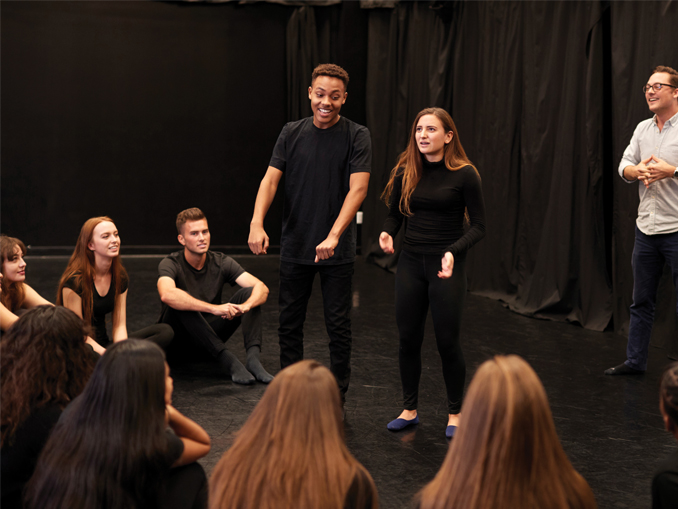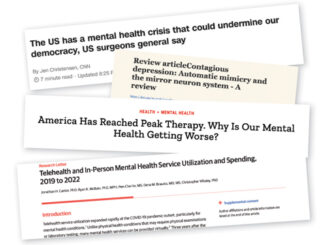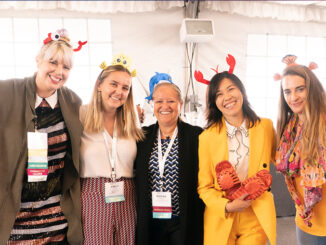 By Will Dennis, Owner/president, UnScripted Productions, Ltd., Newtown, Pennsylvania, williamjdennis@gmail.com @williamjdennis
By Will Dennis, Owner/president, UnScripted Productions, Ltd., Newtown, Pennsylvania, williamjdennis@gmail.com @williamjdennis
Utter the word “improv” to most people and you’ll likely trigger a multitude of reactions:
- Back sweat
- Nausea
- Immediate removal of eye contact
- Planning of an escape route
I have been improvising and teaching people how to improvise for close to 20 years, and even I dread the thought of having to be a participant. If I find myself at a show of any kind and hear the words “time for some audience participation,” I want to throw up. My eyes dart to the ground, and I channel my inner David Copperfield, hoping to disappear into thin air. Yet, it has been my life’s work and my oxygen for two decades now.
The truth of the matter, though, is that everyone is already improvising on a daily basis. As qualitative consultants, especially, you are likely improvising more than you realize. Think of the various scenarios when you are moderating: you’ve prepared and rehearsed extensively, at any moment absolutely anything could happen, you are collaborating with another person/other people, and there’s an audience with very clear expectations. Throughout so much of your day, you are tapping into your inherent improv skills. Because you are already doing it so regularly, there is likely a great deal that you, as a qualitative consultant, can glean from the tenets of applied improvisation.
Think of the level of preparation that goes into creating, editing, recreating, and perfecting discussion guides with questions and objectives for every session with respondents and focus groups. Now think of how often you actually end up using that guide in its entirety or exactly as it’s written; it’s probably pretty rarely. Instead, you listen as a respondent guides you in an unexpected, unique direction. You abandon the guide and begin responding organically in the moment. In other words, you improvise.
When you do this and do it well, authenticity is the result, and insightful conversations can happen. While in these instances it can feel like you are discarding all your prep work, in reality, that prep work has given you the ability to improvise. There is an adage in improv that the best improv training is reading a newspaper. The greatest improvisers in the world are not creating something out of thin air in the presence of strangers. They’ve done so much preparation that, in the moment, they are freed up to discover treasures that were already there.
An improv mindset allows for the development of a new perspective, a new approach to old challenges, a new way of seeing the world—a new mindset.
An improv mindset does not happen by accident. It takes its cue from the same training used to create comedic legends like Tina Fey, Keegan-Michael Key, Martin Short, and countless others. It uses that training, and specifically the bigger ideas behind it, and applies it to everything from the workplace to romantic relationships. There are a multitude of ideas, or tenets, that have been curated for the purposes of applied improvisation. So, how can you begin to develop an improv mindset to apply to your own work? Here are four tenets (of many) from applied improvisation that can help you reimagine your own perspective as a qualitative researcher.
Yes, And
This is the golden rule of improv.
This simple phrase is the building block for all creation. At its core, it is about acceptance and contribution. To improvise (that is, to create collaboratively), the first step is to accept; accept a suggestion and accept an offer from a teammate. Most importantly (and this can help tremendously with creating safe spaces), acceptance refers to the acceptance of one another as human beings with dignity. If we do not see our teams as worthy of acceptance, we will never embrace the possibilities of creating alongside one another.
The second and equally important part of the phrase is “and.” This is the contribution part of the equation. It is not merely enough to say yes, to accept. We must be willing to contribute in such a way that makes ideas, notions, and concepts better and stronger.
When “yes, and” happens, creation thrives.
You can try this out right now. Whether you are alone or with a partner, decide that you are tasked with designing the perfect hotel. Take 60 seconds and go back and forth between partners offering ideas. The only catch is that after the first idea, each response needs to begin with the word “no.” After the 60 seconds, decide your task is now to design the best roller coaster. This time, only take 45 seconds and begin each response with the phrase “yes, and.” You will end up with a terrible hotel and a wild roller coaster.
Make Others Look Good
The biggest roadblock to creativity is self-judgment. Think of the countless times a focus group participant—or even you, yourself—has qualified a statement, question, or response with, “this is dumb, but…” or “this is probably wrong, but…” We give others permission to judge us before they have even heard what we have to offer. Each time we qualify what we say out of fear of failure, we deny ourselves and others the opportunity to discover something truly brilliant.
In improvisation and applied improvisation, the best way to remove self-judgment is to focus on others. Improv is the art of selflessness.
If you commit 100 percent of your focus to making a respondent, coworker, or team member look like a rock star, there is no room left for insecurities to enter and distract.
Del Close, generally considered to be the father of American improv, summed it up this way: “If we treat each other as if we are geniuses… we have a better chance of becoming that.”
Mistakes Are Fumbles and Fumbles Are Opportunities
There are two specific things about this principle that make it my favorite:
- The football analogy. When someone fumbles the ball in U.S. football, every eligible human on the field pounces on the ball and fights to recover it. I have yet to see a football game where a ball gets fumbled and the teams scream in terror, or run the other way, or (better yet) ignore it and hope that it will just disappear. No, a fumble is an opportunity.
- The collective nature of opportunities. Often mistakes are seen as individual failings or shortcomings. It is personalized. When I make a mistake, I have failed, and I am defeated. What often gets missed is the possibility that our mistakes can be gifts for someone else on our team.
Preparation is key. We know this. The risk that often accompanies an extensive level of preparation, though, is the inability to embrace failure, mistakes, or deviation from a plan. When we know how much work was put into preparation, we are hyperaware of when things go “off script.” Ask anyone in the performance industry about mistakes they’ve made on stage, and they will probably run off a list as long as a CVS receipt. No actor, speaker, musician, etc., has journeyed throughout a career without making a mistake. To them, the mistakes are huge, unforgettable, and often the first thing they talk about when they get off stage. For most of those mistakes, though, a few things are true:
- The audience had no idea a mistake was made because they didn’t know what was supposed to happen.
- The audience was aware of the mistake and, because it was embraced and handled, assumed that it was supposedto happen.
- The mistake ended up making the show/performance more memorable because it was a reminder that everything was happening in the present, right now, and would never happen the exact same way ever again.
Mistakes are opportunities, even if those opportunities are beyond anything that was initially planned. When you handle mistakes or mishaps as fumbles, not only will you be ready to turn them into opportunities, but when you do, your respondents will feel more confident and empowered to move forward. Nothing will ever go completely according to plan. As a qualitative consultant, you shine in your ability to respond to the things that go off course. When you treat mistakes like fumbles, everyone in the room benefits.
Listen, Then React
There are a whole slew of reasons why we do not listen.
- The urge to tell a story/make a point/give advice
- An emotional reaction
- Boredom and/or distraction
- Presumed knowledge of what someone is thinking/going to say
- We’re busy thinking about what we should say next
In improv, not listening can implode a scene or game for a number of reasons—but mostly because it is happening in front of a room full of people. You must listen fully to what a teammate or participant is offering because the whole room is also listening. If you react or respond to something too quickly or to something you assumed someone said but they did not, the jig is up. The magic is broken, and the curtain is pulled back. It becomes an extremely helpful system of checks and balances to keep improvisers honest and present.
The best qualitative interviewers aren’t “just winging it,” they are present in the moment to listen and respond because they are overly prepared. This is what applied improvisation is all about.
A quick exercise to help build the skill of listening then reacting:
Find a partner and sit opposite one another face-to-face. Decide on a topic (or better yet, have a third party suggest a topic) for conversation. Begin a back-and-forth conversation around the topic with the only rule being that the first word someone speaks needs to begin with the same letter that ended the other person’s sentence.
Example:
Mary: I used to paint when I was a teenager.
Bob: Really? I used to tap dance.
Mary: Everyone seems to have a passion they’ve left behind.
Bob: Doesn’t it just make you so sad?
Listening takes practice and attention, but effective listening can save time, money, and relationships.
A Changed Perspective
Okay, now that you have an improv mindset, go forth and be a different person.
Not going to happen. These principles themselves are building blocks. If you are reading this, you will not go into your next session as a completely different version of yourself with a different process and different approaches. Even if you tried, you would likely find yourself in a sea of fumbles wondering how to turn them into opportunities.
If these principles resonate with you, find small ways of trying to slowly bring them into your work. Once you see the results, you can then start working toward a new, changed perspective. Applied improvisation is not about ripping off a bandage, it is about a gradual process of results that empower us to take bigger and bigger risks over the course of time in pursuit of something great.
For now, just start by paying attention—notice the moments and events in your day where “yes, and” is fully at work, where a mistake may be an opportunity in waiting, where someone else can be treated like a genius, and where effective listening can lead to acceptance and empowerment.
Happy fumbling, friends.





1 Trackback / Pingback
Comments are closed.